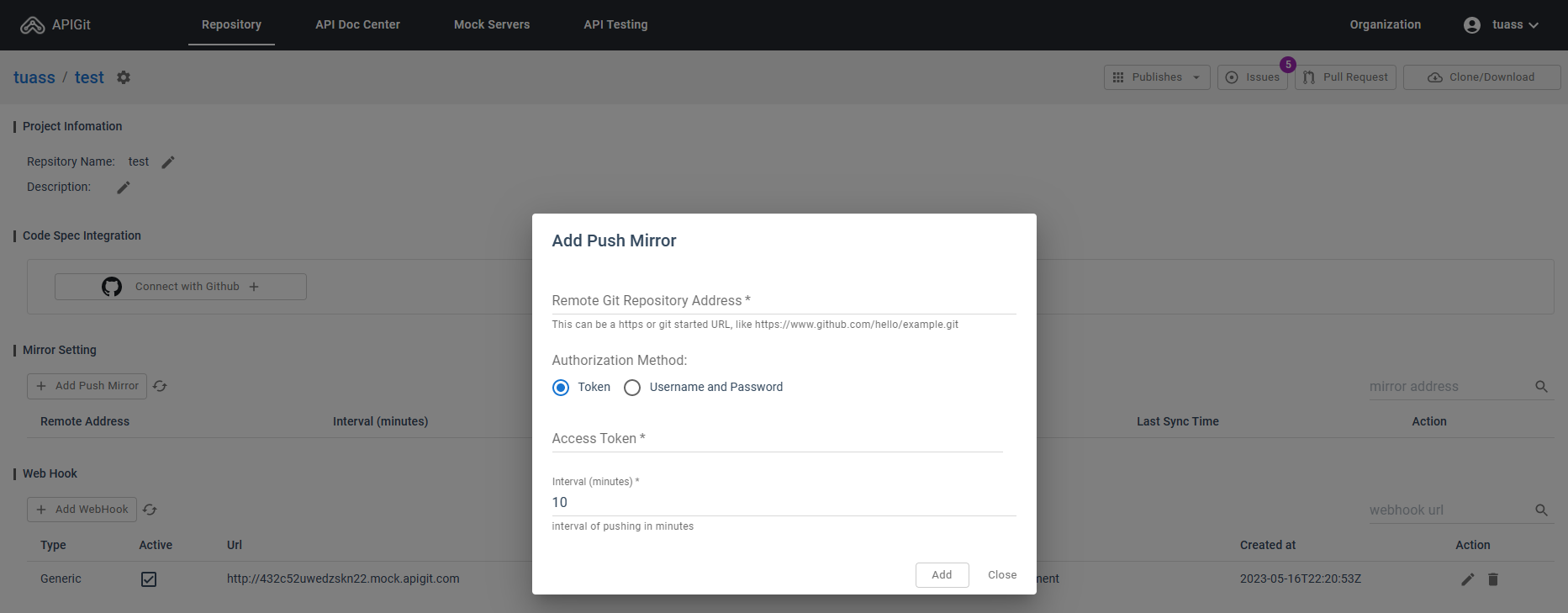What is push mirrors?
push mirrors refer to remote repositories that are set up to mirror the contents of another repository. When you perform a Git push to a push mirror, the changes you push to the mirror repository are automatically propagated to the mirrored repository, keeping them in sync.
Push mirrors are often used in distributed development environments where multiple teams or individuals work on the same codebase across different locations. They allow for redundancy, collaboration, and backup purposes. By using push mirrors, everyone can work on their local repositories and push their changes to a central mirror repository, ensuring that the changes are distributed to other team members or locations.
How to set upstream push mirrors?
Navigate to your repository, and click the setting icon beside your repository name.

What does Apigit support?
The Git repository is hosted on any of your specified git server which can be a popular platform such as Github, Gitlab, Bitbucket, Azure, AWS, Gitee, or even a self-hosted Git server with public access . APIGit employs a smart two-way synchronization with your remote repository, ensuring that all commits made on APIGit are automatically synchronized with your specified servers, and vice versa. Your designated Git repository acts as the authoritative source of truth.

What problems may you face?
You might get an error message if you use username and password to set upstream push mirrors for github repository.
In this case, you need a access token.
remote: Support for password authentication was removed on August 13, 2021. remote: Please see https://docs.github.com/en/get-started/getting-started-with-git/about-remote-repositories#cloning-with-https-urls for information on currently recommended modes of authentication. fatal: Authentication failed for https://github.com/tuasxxxx/test.git
Related Posts
API Repository
APIs have become a vital part of modern software and business infrastructure, enabling organizations to expand the capabilities of software and improve integration with external services. The process of API development involves several stages, including planning, designing, developing, testing, deploying, and maintaining APIs. The API producer is responsible for creating and managing the API, while the API consumer utilizes the API to build applications or integrate with existing software. Apigit's API Platform is designed to help organizations navigate the API development and management process more effectively, with native Git support and streamlined collaboration. By leveraging Apigit's capabilities, businesses can improve operational efficiency, integration with external services, and stay competitive in the rapidly evolving digital landscape.
apigit custom webhooks
A webhook is a way for an application to provide real-time information to another application or service by sending HTTP requests when a specific event or trigger occurs. It allows applications to communicate and share data with each other automatically.
two-way sync with other git providers
Two-way synchronization with Git providers ensures that changes made in either APIGit or your preferred Git repository are automatically updated in both systems, maintaining consistency across development environments.
Ready to get started with APIGIT?
Join thousands of developers and teams who are already using APIGIT to streamline their API development workflow.